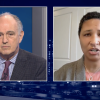Harvard political philosopher and Democratic gubernatorial candidate Danielle Allen wants to become the state's chief executive, in part, she says, to expand democracy in Massachusetts by making information about government easier to find.
Part of Allen's campaign pitch is that Massachusetts needs to do a better job combating misinformation online by supporting civics and history education, strengthening local journalism, and opening up the governor's office to the public records law. Improving the state's civic health, Allen said, will help rectify many of the problems exposed or aggravated by the pandemic, including the climate crisis, racial inequity and injustice.
"At the end of the day, addressing all of those things depends on our having a stronger democracy. That is really the case I'm trying to make, and I do believe in the people of Massachusetts. We are leadership people," Allen told GBH News in an interview Wednesday, the day before the first anniversary of the Jan. 6 insurrection at the United States Capitol.
More Politics
Allen spoke to GBH News State House reporter Mike Deehan about what can be done at the state level to protect democracy, why "our democracy is in dire straits" and how the next governor can help fix it.
This transcript has been lightly edited for clarity and length.
Deehan: What did the storming of the Capitol in D.C. mean for leaders in Massachusetts? What lessons should they have taken away?
Allen: I think Jan. 6 showed us all that a democracy that we knew was in trouble is in dire straits. That matters for everybody, everywhere. At the end of the day, our democracy is built out of states. And so the question is, if we're going to have a healthy democracy, we've got to achieve that health state by state, and really build up from that to securing the health of our national democracy. So I think we have a leadership job to do here in Massachusetts to show the path forward, to forge a way out of these dark, hard times.
Deehan: How do you approach conservatives in 2022 when so many on the opposite side of the spectrum from you still think that the 2020 election was illegitimate? How do you plan to reach out to include voters in Massachusetts who might be skeptical of the entire process?
Allen: To address that issue of misinformation and folks who are being radicalized by a lie, we've got to fix our information ecosystem. The thing I'm most excited about in my agenda is the work on that front. We've got to face the facts. Facebook has been killing our democracy, OK? It has really supported the spread of misinformation. It has supported radicalization around things like the "Big Lie" [that Donald Trump won the 2020 presidential election] and the like. And we've got to rebuild a system of local journalism of really healthy information. There are several points in my agenda that support that. I'm committing the executive branch to adhering to the requirements of the Public Records Act. People deserve really clear, stable information about what's happening in their government. We've got to get that done in order to rebuild trust and rebuild our capacity to govern together effectively.
Deehan: Are race and the history of race taught well enough in our public schools?
Allen: We have so much progress to do on how we teach our history, generally, just across the board. ... We absolutely need to be able to be honest about the sins of both omission and commission in our own past, as well as being able to celebrate our accomplishments. It matters. It's a beautiful thing that Massachusetts was the first state to abolish enslavement. Yet here we also find ourselves in the 21st century with an extraordinary racial wealth gap. So we have to tell the story of how both of those things can be true at the same time in Massachusetts. And that requires honesty, [and] requires equipping our educators with the tools they need to teach hard histories.
Deehan: A big question for any of the Democrats in the race right now, when it looks like there's a good chance a Democrat will be the next governor, is how do you get that Democratic supermajority to enact more progressive action?
Allen: I will say there is great legislation that has already been accomplished. Where the job is really [is] implementation.
I've been talking to people over the past year working at a grassroots level, but also reaching out to our elected officials and really trying to understand their priorities. I have heard people express repeated frustration about laws that have been passed that have not been executed by the governor's office, and where the Legislature is looking to sort of re-legislate things to try to drive that through. ... I would like to be the governor who executes and implements. That's the job, after all. So one thing I would love to do is just ask the Legislature to sort of develop a list of all those things that have gone unimplemented so that we could actually get the executive branch doing what it's supposed to do, which is execute the people's will.
Deehan: When it comes to building the cabinet and running those agencies, what do you look for in hiring? Do you have any experience in building a team like that?
Allen: I've been leading and managing organizations for 20 years. Starting out leading a $60 million division at the city of Chicago, leading a $6 billion foundation where I had to hire a new chief investment officer, hired two different presidents, etc. So absolutely, I've been doing team building and making critical hires for my whole career.
I will be looking for agency leaders who share my vision of one commonwealth, the idea that if we look at our problems commonwealth-wide, we can achieve more powerful solutions, and that if we build solutions from the ground up going on the knowledge of communities, we can empower people and drive success.
Deehan: Do you have any political role models, historical or contemporary, that you look toward?
Allen: Congressman Jamie Raskin [D-Maryland] is a good friend and I've learned a lot from him. I certainly have a great amount of respect for him. I have a huge amount of respect and admiration for Gov. [Deval] Patrick as well. I have learned from him and in many ways and try to incorporate his lessons. Gov. Phil Bredesen in Tennessee is another person from whom I've learned a lot. And then there are the international figures: Nelson Mandela, as you might imagine, and Angela Merkel, as well, as somebody from whom I've learned a lot.








